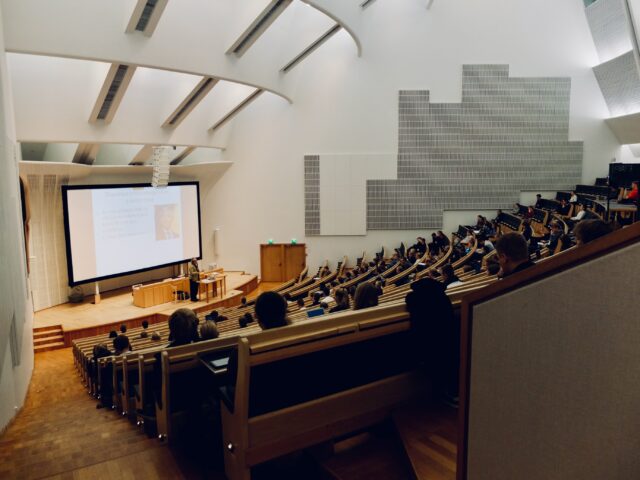Quest University is reportedly indefinitely pausing its academic operations at the end of this term. Citing ongoing financial difficulties, Quest’s Board of Governors stated that move is the only “responsible” decision. “This action is being taken so the board and the executive can focus on restructuring finances and operations,” read a statement from the board. “The university will continue current operations through the spring and then undertake an evaluation as to when it may be able to resume future enrollments and full academic programming.” The class of 2023 will graduate as scheduled in April, other current students will be assisted with transfer to other institutions, and application fees and other fees paid by prospective students will be refunded.

Top Ten News
February 27, 2023
In a recent interview with the EvoLLLution, April Philpotts of the University of Waterloo discusses recent trends and strategies in continuing education and the postsecondary sector. Philpotts touches on issues such as the rise of AI and the decrease in the shelf life of STEM degrees and the impact these are having on the sector as a whole. Looking to continuing education and workforce education, she also discusses trends such as the use of shorter professional certificates to support upskilling and industry-institution partnerships to bridge the education-to-workforce gap. Looking to the future, Philpotts predicts that higher-order skills such as critical thinking, problem solving, and the “science and art of good questioning” will remain essential parts of higher education.
Algoma University and Shingwauk Kinoomaage Gamig (SKG) have signed a new collaborative agreement and a Memorandum of Understanding. Under these agreements, the parties will work together to ensure SKG successfully becomes an accredited, autonomous, and sustainable Centre of Excellence in Anishinaabe Education, as well as an accredited Indigenous Institute. The partnership will also support the establishment of an Anishinaabe School of Education, which will offer a unique Indigenous-focused teacher education program. “This collaborative agreement sets the foundation in which our approach honours and recognizes SKG’s leadership in the education of Anishinaabe people,” said AlgomaU VP Nyaagaaniid, Anishinaabe Initiatives, Equity and Student Success Mary Wabano-McKay.
The Journal de Montréal reports that the Collège Maisonneuve’s administration has come under fire from the Société générale des étudiantes et étudiants du Collège de Maisonneuve for demanding the withdrawal and destruction of leaflets denouncing the administration. The leaflets—which Journal de Montréal says were distributed during the college’s open house—accuse the administration of inaction on issues related to racist behaviour from staff, a lack of mental health accommodations, a toxic environment, and more. The students say they have tried to work with the administration for several months on the issues. The cégep’s leadership has allegedly sent a formal notice to SOGÉÉCOM demanding an apology and the destruction of any remaining leaflets.
The Government of Canada has launched a new funding program that will provide nearly $30M over four years to support and promote the commercial deployment of small modular reactors. The program is intended to support the development of supply chains for SMR manufacturing and fuel supply, as well as research on safe waste management solutions. The funds will be open to universities as well as provincial and territorial governments, private companies, utilities, and Indigenous groups. “As Canada advances toward a net-zero grid by 2035, growing our clean energy industries is a vital undertaking,” explained Canada Minister of Natural Resources Jonathan Wilkinson.
Université de Sherbrooke has received $1.9M in funding from the Government of Canada’s Cyber Security Cooperation Program to support two cybersecurity projects. The projects—which are managed by USherbrooke’s cybersecurity hub—will focus on protecting the electrical grid and cybersecurity in a 5G wireless environment. “The scope will be interdisciplinary and will address non-traditional dimensions such as governance, legal and regulatory compliance, and social acceptability,” said USherbrooke Professor Pierre Martin Tardif. “Students from all levels will be involved in the project. In time, the partners will be able to hire them in order to maximize the transfer of knowledge in favour of the student experience.”
Camosun College has taken the next step toward its on-campus film studio by selecting Visionary Education Technology Holdings Group Inc (VEDU) to construct the new facility. The partners are now working together to “finalize the scope, timeline and cost to build a film studio with education components.” Victoria News reports that Camosun recently offered a 99-year lease in exchange for a company designing, building, and funding the film studio and digital media centre. The college has also reportedly been working to address neighbourhood concerns about the development’s impact on the surrounding environment.
The University of Waterloo and the University of New Brunswick have both announced new programming. UWaterloo has responded to student demand for writing courses by creating a Creative and Professional Writing program. The program will allow students to study everything from fiction to business communications as they develop a distinct writing voice and creative energy. Meanwhile, UNB is piloting a mandatory first-year arts course on climate change that will cover topics such as international treaties, climate change in the media, and humanitarian crises. “Social science and humanities have the tools to understand some of the challenges we face,” explained UNB Assistant Professor Dr Heather Millar. “Arts disciplines also have the key to solutions and how we might imagine different futures.” UNB states that it is the first in Canada to mandate climate education for arts students.
Aurora College has updated its critical milestone timeline for the Aurora College Transformation. Aurora has added three programs to the timeline—Bachelor of Education, Bachelor of Social Work, and General Arts & Science— and plans to have year 1 of the programs implemented by Fall 2024. Other adjustments were made to the milestone dates in Phase 2 and new milestones were introduced, such as the establishment of the Indigenous Knowledge Holders Council and the implementation of the polytechnic university funding formula. “The introduction of university level general studies and the return of social work and education programs are an important step in Aurora College’s plans to increase access to post-secondary educational opportunities for NWT residents,” said Aurora President Glenda Vardy Dell.
The City of Hamilton is reviewing its contracts with Redeemer University after the death of a non-binary student on campus last year. Redeemer reportedly receives part of its funds through city contracts. Hamilton’s LGBTQ advisory committee recommended that the city review the funding arrangement and verify if the university adheres to the city’s gender identity policy. The city also has reportedly rented space from Redeemer. City solicitor Susan Nicholson said that any contractual relationships between the city and Redeemer will be reviewed by legal staff.
